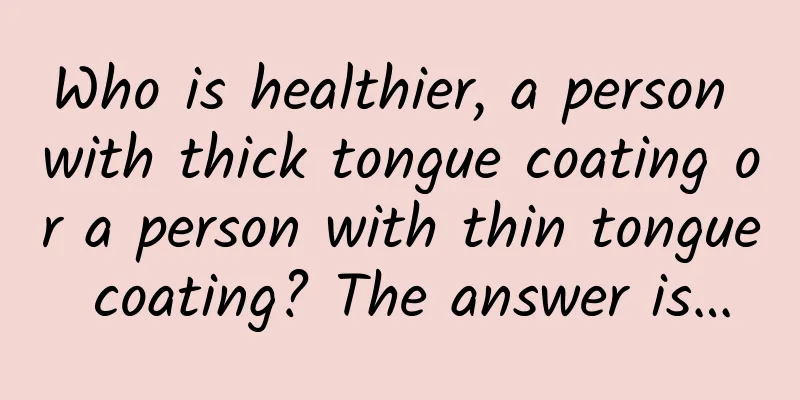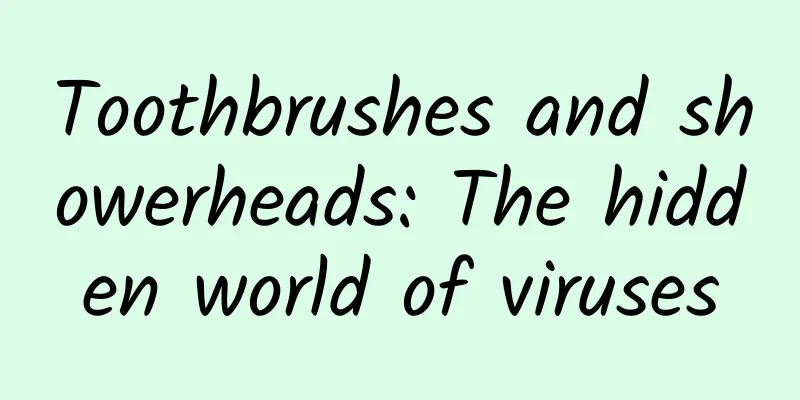Who is healthier, a person with thick tongue coating or a person with thin tongue coating? The answer is…

|
Have you ever observed your tongue coating? In the article "A detail that is easy to miss when brushing your teeth may cause bad breath! (You can review previous articles)", many people are very curious about the color of their tongue coating. Everyone's tongue coating is different in color, and even a person's tongue coating is different at different times. Some are white and thin like frosting, some are white and thick like putty, and some are yellow and thick like the edge of a fried egg... Are these different tongue coatings related to health? Let's talk about it today. What is tongue coating? The tongue coating is a layer of moss-like substance covering the back of the tongue. It is formed by a mixture of desquamated keratinized epithelial cells, food residues, bacteria, saliva and metabolic products. Copyright image gallery changed Specifically, the mucosal cells of the oral cavity and tongue are constantly metabolizing, and the shed epithelial cells are mixed in the saliva. The saliva contains a variety of substances, such as mucin, which will adhere to the surface of the tongue together with the shed cells to form the tongue coating. At the same time, when people eat, food residues will also remain on the tongue surface. After a period of time, these residues will mix with other components in the oral cavity to form part of the tongue coating. The oral cavity is a "big world" of microorganisms, with a large number of bacteria, fungi and other microorganisms. These microorganisms will decompose food residues, and their metabolites will also adhere to the surface of the tongue and participate in the formation of tongue coating. Under normal circumstances, the tongue coating is thin and evenly distributed, and is pale white, referred to as "pale red tongue, thin white coating". It is one of the signs of oral and digestive system health. Thick tongue coating Don't worry in most cases The thickness of the tongue coating is related to the shedding and renewal rate of oral cells. If the metabolism is vigorous, the shedding cells increase and accumulate on the tongue surface, and the tongue coating will become thicker, otherwise the tongue coating will become thinner. Therefore, the metabolism of different individuals and the same individual at different times will be different, and the tongue coating will also change. In addition, there are some physiological factors that can also make the tongue coating thicker: Differences in saliva production Saliva can effectively wash the tongue surface, reducing the accumulation of food residues, bacteria and exfoliated cells. When the amount of saliva secretion decreases, the tongue coating tends to thicken. In addition, the viscosity of saliva will also affect the washing effect. People with thick saliva tend to have thicker tongue coating than those with clear saliva. The impact of eating habits For people who consume liquid or soft food for a long time, the tongue surface lacks friction, the natural cleaning mechanism is weakened, and the tongue coating is prone to thickening; greasy food rich in fat (such as hot pot, barbecue, frying, etc.) and high-protein diet may promote thickening of the tongue coating. The impact of oral hygiene: Oral hygiene is the most important factor affecting the formation of tongue coating. If you do not pay attention to oral hygiene, food residues and bacteria will accumulate on the tongue surface, causing the tongue coating to become thick. Copyright images in the gallery. Reprinting and using them may lead to copyright disputes. These diseases May cause abnormal tongue coating 1 Digestive system disorders Insufficient gastrointestinal motility and gastrointestinal dysfunction (such as gastritis and constipation) will affect food digestion and absorption, lead to accumulation of metabolic waste, and cause thick, greasy, and yellow tongue coating. 2 Infection or inflammation When you have a cold or fever, your body's immunity decreases, saliva secretion decreases, tongue movement decreases, and bacteria proliferate in your mouth, which may cause the tongue coating to thicken. When the tongue mucosa is infected by fungi (such as Candida albicans), the tongue coating is like a thick layer of cheese tightly attached to the back of the tongue. 3 Certain chronic systemic diseases If diabetic patients do not control their blood sugar well, it will lead to the proliferation of bacteria and increased metabolic products in the mouth, the tongue coating will turn yellow and thick, and the saliva secretion will decrease, leading to dry tongue coating. Liver disease or metabolic syndrome, etc., can also cause the problem of long-term thick tongue coating. 4 Other diseases Anemia, vitamin B2 and folic acid deficiency can cause atrophy of the tongue papillae, making the back of the tongue smooth and free of tongue coating, forming a "mirror tongue". Atrophic glossitis (mirror tongue or smooth tongue) 5 Drug effects Long-term use of some medications can also lead to abnormal tongue coating. For example, long-term or large-scale use of antibiotics will disrupt the balance of oral flora, leading to the proliferation of individual bacteria or fungi, causing thickening of the tongue coating. Some drugs (such as amoxicillin and chloramphenicol) produce melanin during metabolism, causing the tongue coating to turn black; long-term use of chlorhexidine mouthwash and taking bismuth agents can also cause the tongue coating to turn black, which can be restored after stopping the medication. Some antidepressant and antipsychotic drugs will reduce the secretion of oral saliva, which is not conducive to the self-cleaning function of the tongue, leading to thickening of the tongue coating. It should be noted that the tongue coating is only an external manifestation of the imbalance of the body's internal environment. It is not the direct cause of these diseases, nor is it used as a diagnostic criterion for the disease. Parents may sometimes find that their children have red and white patches on their tongues, surrounded by a raised edge, with a winding shape like a map. This condition is very vividly called "geographic tongue". Geographic tongue is also called exfoliative glossitis or migratory glossitis. Its main symptom is the temporary exfoliation and disappearance of the filiform papillae on the back of the tongue. The lesions are shallow and gradually spread to the surrounding areas, forming an irregular map shape. This is a benign, non-infectious, chronic recurrent oral inflammatory state that can occur in people of any age, but is more common in children. The cause of geographic tongue is still unclear. It may be related to genetics, mental psychology (mood swings, mental stress, fatigue, insomnia, etc.), nutrition (nutritional problems such as indigestion, vitamin B deficiency, zinc deficiency, anemia, etc. are related to the occurrence of geographic tongue), immunity (geographic tongue is more common in people with allergic constitutions), and other factors. Local factors such as childhood caries and stimulation of the eruption of deciduous teeth may also induce geographic tongue. Geographic tongue is a self-limiting disease and generally does not require special treatment. You don’t need to be too anxious. If it does affect your life, you can try to find the cause under the guidance of a specialist (pediatrician, dentist), and adjust the treatment direction in a targeted manner to achieve the best treatment effect. You can also pay attention to the following aspects in your daily life: Diet adjustment: Maintain a balanced diet and avoid spicy and irritating foods. Oral hygiene: Keep your mouth clean, brush your teeth and rinse your mouth regularly. Emotional management: Maintain a good attitude and avoid excessive tension and anxiety. Regular check-ups: Perform regular oral examinations to detect and treat oral diseases in a timely manner. References [1]. Seerangaiyan, K. et al. Tongue coating: its characteristics and role in intra-oral halitosis and general health-a review[J]. Journal of breath research, 2018,12(3), 034001. [2]. Van der Sleen et al. The effect of tongue cleaning on breath odour and tongue coating: a systematic review[J]. Int J Dent Hygiene, 2010(8),258–268. [3]. Vartul Dwivedi et al. Effectiveness of Various Tongue Cleaning Aids in the Reduction of Tongue Coating and Bacterial Load: A Comparative Clinical Study[J]. The Journal of Contemporary Dental Practice, 2019(20:4),444-448. [4]. Matsui et al. Effects of tongue cleaning on bacterial flora in tongue coating and dental plaque: a crossover study[J]. BMC Oral Health, 2014,14:4. [5]. Timmesfeld N et al. Mechanical tongue cleaning is a worthwhile procedure to improve the taste sensation[J]. J Oral Rehabil 2021;48:45–54. [6]. Vinicius Pedrazzi et al. Tongue-cleaning methods: A comparative clinical trial employing a toothbrush and a tonque scraper[J]. J Periodontol, 2004,75(7):1009-1012. [7]. Yang Huamei, Zhou Yu, Zeng Xin, et al. Research progress on risk factors of geographic tongue[J]. West China Journal of Stomatology, 2015, 33(1): 93-97. Planning and production Author: Zhao Hechuan Zhuozheng Medical Reviewer: Wu Bin, Director of the Department of Stomatology, Beijing Chest Hospital, Capital Medical University Planning丨Yang Yaping Editor: Yang Yaping Proofread by Xu Lai and Lin Lin |
>>: Is it okay to drink coconut water at 9.9 yuan per liter? The truth is revealed...
Recommend
Will my milk supply decrease if I don't get enough rest?
After birth, babies need to take in enough nutrit...
What is the reason for women's leucorrhea to be watery?
As a woman, you have more or less some knowledge ...
How to relieve back pain during menstruation
Back pain during menstruation is a symptom that m...
What to do if your menstrual period is irregular
I believe that many female friends have found tha...
The little girl has a lump in her breast and it hurts
Little girls are still at an age of ignorance, an...
The things that white-collar workers carry with them are actually deadly health killers
Female white-collar workers are more particular a...
Can women have sex if they have vaginal bleeding during ovulation?
Vaginal bleeding during ovulation is a normal phe...
Are there many problems with gynecological examinations?
Are there many problems with gynecological examin...
What is interventional treatment for adenomyosis?
All uterine diseases are closely related not only...
What are the dietary treatments for ovarian cysts?
Ovarian cysts are the main threat to the health o...
What is the normal range of anterior uterine size?
Generally speaking, the normal size of the uterus...
How to remove eye wrinkles scientifically and effectively?
In order to maintain youthful beauty, a woman who...
What can women eat to enlarge their breasts the fastest and most effectively
Women all hope to have proud and firm breasts, bu...
Can I use skin care products normally during pregnancy?
For women, many things are difficult during pregn...
Is intrauterine adhesion surgery painful?
Intrauterine adhesion is a female disease, and th...









